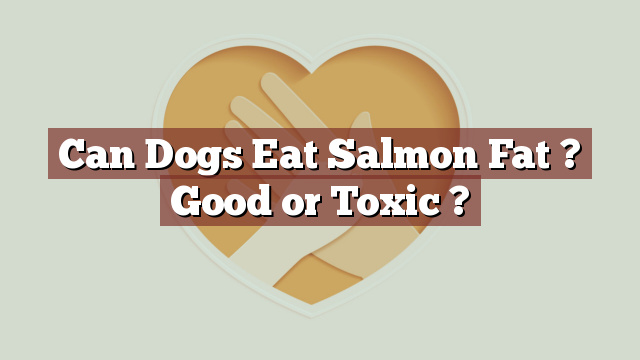Can Dogs Eat Salmon Fat? Good or Toxic?
Dogs are known for their curious nature and eagerness to eat pretty much anything that comes their way. As responsible pet owners, it is crucial for us to be aware of what foods are safe for our canine friends and which ones can potentially harm them. This article aims to shed light on whether dogs can safely consume salmon fat, a question that many pet owners have wondered about.
Nutritional Value of Salmon Fat: A Detailed Analysis
Salmon fat is known to be rich in omega-3 fatty acids, which are essential for maintaining a healthy diet for both humans and canines. These fatty acids play a vital role in promoting skin and coat health, reducing inflammation, improving cardiovascular health, and supporting brain development. Additionally, salmon fat contains a considerable amount of vitamin D, which is essential for proper bone health and immune function.
Can Dogs Eat Salmon Fat? Safety Considerations for Your Canine Companion
Yes, dogs can safely consume salmon fat. In fact, many commercial dog foods and supplements contain salmon fat as a key ingredient. Veterinary experts agree that when fed in moderation, salmon fat can provide numerous health benefits to dogs, thanks to its omega-3 content. However, it is crucial to ensure that the salmon fat is cooked or processed properly to eliminate any potential bacteria or parasites that might be harmful to dogs.
Potential Risks or Benefits of Feeding Salmon Fat to Dogs
Feeding salmon fat to dogs can bring about several benefits. As mentioned earlier, the omega-3 fatty acids in salmon fat can contribute to improved skin and coat health, reduced inflammation, and enhanced cardiovascular function. These fatty acids also support brain development in puppies and can help senior dogs maintain cognitive function.
However, it is important to note that overfeeding salmon fat to dogs can lead to weight gain, as it is a calorie-dense food. Additionally, some dogs may be allergic or sensitive to salmon, so it is crucial to monitor their reactions after consuming it for the first time.
What to Do if Your Dog Eats Salmon Fat: Expert Recommendations
If your dog accidentally consumes a large amount of salmon fat, it is important to monitor their behavior and symptoms closely. In most cases, mild gastrointestinal upset such as diarrhea or vomiting may occur. However, if your dog experiences severe symptoms such as difficulty breathing, swelling, or extreme lethargy, it is crucial to seek immediate veterinary attention.
Conclusion: Is Salmon Fat Good or Toxic for Dogs? A Professional Perspective
In conclusion, salmon fat is generally safe and beneficial for dogs when consumed in moderation. Its high omega-3 content provides various health benefits and can enhance your dog’s overall well-being. However, it is essential to ensure that the salmon fat is properly cooked or processed to eliminate any potential risks.
As with any new food, it is always recommended to introduce salmon fat gradually into your dog’s diet and monitor their reactions closely. If you have any concerns or questions about feeding your dog salmon fat, it is best to consult with your veterinarian, who can provide you with personalized advice based on your dog’s individual needs.
Thank you for investing your time in exploring [page_title] on Can-Eat.org. Our goal is to provide readers like you with thorough and reliable information about various dietary topics. Each article, including [page_title], stems from diligent research and a passion for understanding the nuances of our food choices. We believe that knowledge is a vital step towards making informed and healthy decisions. However, while "[page_title]" sheds light on its specific topic, it's crucial to remember that everyone's body reacts differently to foods and dietary changes. What might be beneficial for one person could have different effects on another. Before you consider integrating suggestions or insights from "[page_title]" into your diet, it's always wise to consult with a nutritionist or healthcare professional. Their specialized knowledge ensures that you're making choices best suited to your individual health needs. As you navigate [page_title], be mindful of potential allergies, intolerances, or unique dietary requirements you may have. No singular article can capture the vast diversity of human health, and individualized guidance is invaluable. The content provided in [page_title] serves as a general guide. It is not, by any means, a substitute for personalized medical or nutritional advice. Your health should always be the top priority, and professional guidance is the best path forward. In your journey towards a balanced and nutritious lifestyle, we hope that [page_title] serves as a helpful stepping stone. Remember, informed decisions lead to healthier outcomes. Thank you for trusting Can-Eat.org. Continue exploring, learning, and prioritizing your health. Cheers to a well-informed and healthier future!

